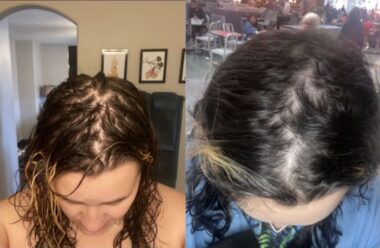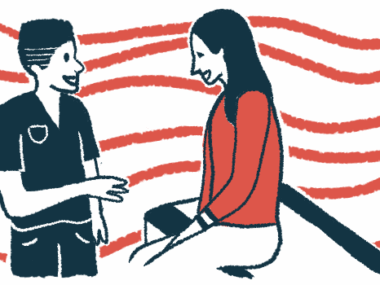How I combat hair loss caused by Cushing’s disease
These products and strategies help strengthen and grow my curls
Written by |

One symptom of Cushing’s disease that really affected me was hair loss. My hair is my favorite feature; it’s curly like my mom’s, which always made me feel beautiful. Watching it fall out in clumps was traumatizing and scary, and it made me incredibly sad and self-conscious. I started to have bald spots at age 25, and whether it was true or not, I felt like everyone noticed.
I started to do at-home treatments for my hair, and over the past year, I’ve seen a tremendous difference in hair growth and quality, especially on my scalp. I even have a ton of baby hairs — proof that I have new growth!
Following are the tips and tricks that have helped me combat hair loss.
Products
I use hair oil constantly. Coconut and argan oil are my go-to oils, but almond, castor, and rosemary oil are also helpful. I add the oil to my scalp and slowly massage it in with my fingers. I leave the product on overnight and wash it off in the morning.
I also do weekly hair masks that help strengthen and moisturize my hair. I switch these up, but my current favorite is this blueberry one. It smells absolutely amazing and helps keep my hair soft. I do dye my hair (it’s currently half-pink), so a weekly mask also helps counteract the effects of the bleach and hair dye. I do want to note that I have curly hair, so the products I use might not work for other textures.
In addition, I cut down my shampoo use to only twice a week. In between I use my hair mask or do a “co-wash,” where I wash my hair with only conditioner. Shampoo can dry out hair, so using less of it is beneficial for me. This won’t work for everyone, as some people naturally have more oils in their hair, but it has made a big difference in keeping my hair healthy.
Changes in routine
One big change I made was using hair clips instead of ties. The ties can pull at your scalp and cause breakage, which can increase hair loss. I’ve found that clips pull a lot less. I wear my hair up a lot, and this change has not only helped my hair, but it’s also decreased my headaches.
I also braid my hair before going to sleep, which helps me avoid tangles. I am a wild sleeper, rolling around in bed like it’s my job. But braids stay in my hair for days, keeping it safe and protected no matter what I’m doing. This is especially helpful when I’m not feeling well.
New purchases
The water is hard in my New York City apartment, so I bought myself a shower filter that removes chemicals and minerals that can harm your hair. I got a pretty cheap one, just to give it a shot, but I’m already seeing an improvement in my hair. I’m not sure if a higher-quality filter would make more of a difference.
My doctor recommended trying Viviscal hair growth supplements, which contain biotin, zinc, and other vitamins and minerals. I’ve been taking those as well as upping my iron intake, as low iron levels can lead to hair loss. It’s hard for me to measure exactly how much these have helped, though.
Hair loss can be difficult to manage, and it’s affected my self-esteem, but I’m proud of the progress I’ve made so far. I’m not back to where I was pre-Cushing’s, but I can absolutely see the growth. I hope to keep making strides in taking care of my hair.

From left, Noura Costany’s hair in December 2023 and January 2024. (Photos by Noura Costany)
How do you keep your hair healthy? Please share in the comments below! You can also follow my journey on TikTok and YouTube.
Note: Cushing’s Disease News is strictly a news and information website about the disease. It does not provide medical advice, diagnosis, or treatment. This content is not intended to be a substitute for professional medical advice, diagnosis, or treatment. Always seek the advice of your physician or other qualified health provider with any questions you may have regarding a medical condition. Never disregard professional medical advice or delay in seeking it because of something you have read on this website. The opinions expressed in this column are not those of Cushing’s Disease News or its parent company, Bionews, and are intended to spark discussion about issues pertaining to Cushing’s.






Leave a comment
Fill in the required fields to post. Your email address will not be published.